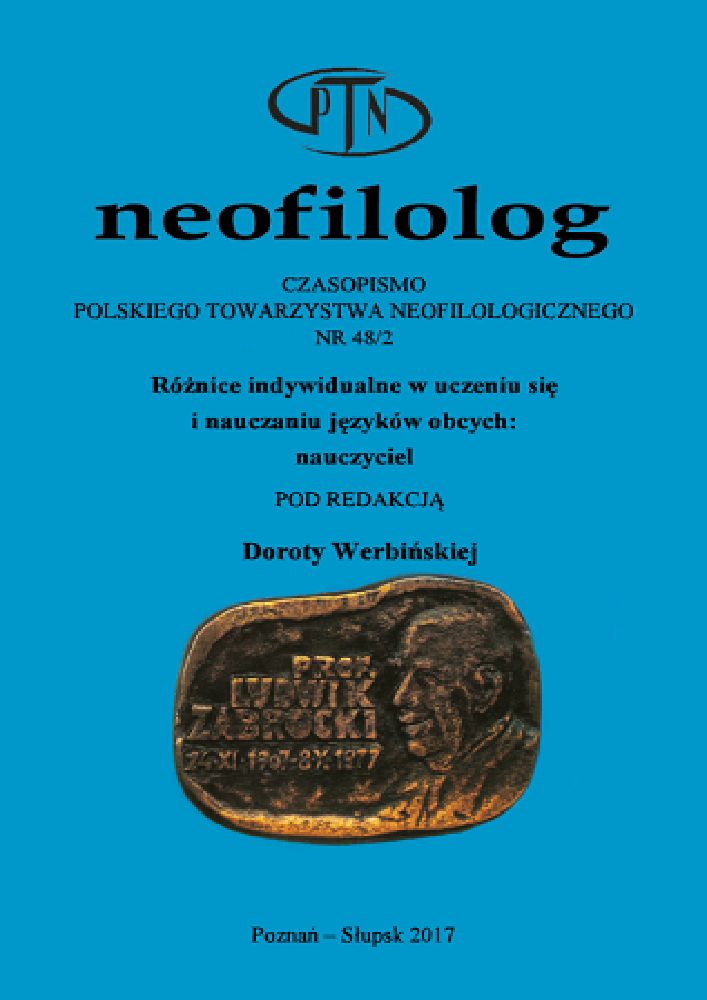Abstrakt
Each learning is, by its very nature, a situation of conflict as well as cognitive and socio-affective, and its intensity depends on the learner's existential competence (savoir-être) and individual differences. To learn effectively, one must regularly use cognitive tools that constitute the mental equipment of the person. The teacher as a mediator could encourage the learner to better use the tools he or she already has or to develop new tools that are missing for now. The theoretical remarks will be supported by examples from empirical research in which Didactic Dialogue has been used, which is an approach for didactic mediation in the language class.
Bibliografia
Barth, B.-M. 1993. Le savoir en construction. Paris: Retz.
Bruner, J.S. 2006. Kultura edukacji. Kraków: Universitas.
Cicurel, F. 1996. „L’instabilité énonciative en classe de langue. Du statut didactique au statut fictionnel du discours”. Les carnets du Cediscor. F. Cicurel, E. Blondel (red.). „La construction interactive des discours de la classe de langue”, 4: 78-92.
Feuerstein, R. i Spire, A. (2009). La pédagogie Feuerstein ou La pédagogie à visage humain. Latresne: Le Bord de l’eau.
Garanderie de La, A. [1974]/1999. Une pédagogie de l’entraide. Lyon: Chroniques Sociales.
Garanderie de La, A. 1984. Le dialogue pédagogique avec l’élève. Paris: Le Centurion.
Mihułka, K. 2015. „Naturalna komunikacja na lekcji języka obcego – stan rzeczywisty czy niedościgniony cel?”. Języki Obce w Szkole, 2: 82-89.
Pawlak, M. 2009. „Rola nauczyciela w kształceniu procesów interakcyjnych w klasie językowej”. (w) Nauczyciel języków obcych dziś i jutro. M. Pawlak, A. Mystkowska-Wiertelak i A. Pietrzykowska (red.). Poznań: Wydział Pedagogiczno-Artystyczny UAM, str. 311-337.
Piaget, J. [1923]/2005. Mowa i myślenie dziecka. Warszawa: PWN.
Piotrowski, S. 2011. Apprentissage d’une langue et communication. Lublin: Towarzystwo Naukowe KUL.
Seretny, A. 2014. „Rola efektu zwrotnego w dydaktycznym dyskursie interakcyjnym”. Acta Universitatis Lodziensis, „Kształcenie polonistyczne cudzoziemców”, 21: 37-50.
Sujecka-Zając, J. 2016. Kompetentny uczeń na lekcji języka obcego. Wyzwania dla glottodydaktyki mediacyjnej. Lublin: Wydawnictwo Werset.
Vermersch, P. 1994. L’entretien d’explicitation en formation initiale et continue. Paris: ESF.
Weil-Barais, A. i Resta-Schweitzer, M. 2008. „Approche cognitive et développementale de la médiation en contexte d’enseignement-apprentissage”. La nouvelle revue de l’adaptation et de la scolarisation, 42(2): 83-98.
Wygotski L. [1934]/1989. Myślenie i mowa. Warszawa: Państwowy Instytut Wydawniczy.
Netografia
Baker, M. 2003. „Les dialogues avec, autour et au travers des technologies éducatives”. L’orientation scolaire et professionnelle, 32/3: Coopérer et apprendre par le dialogue. [online: https://osp.revues.org/2776; DW 4.01.2016].
Beillerot, J. 2004. „Médiation, éducation et formation”. Tréma, 23 [online: http://trema.revues.org/572; DW 11.02.2016].
Freinet, C. 1964. „Les invariants pédagogiques. Code pratique d’école moderne”. Bibliothèque de l’École Moderne, 25. [online: http://www.icem-pedagogie-freinet.org/node/18353#.%20La%20nature%20de%20l%27enfant; DW 12.01.2016].
Le Poul, H. 2002. „Le dialogue pédagogique”. Éduquer, 1. [online: http://rechercheseducations.revues.org/16; DW 16.01.2016].
Mayer, Ch. 2006. „Connaitre davantage la méthode Feuerstein”. (w) 8eme Biennale de l’Education et d la Formation, Débats sur la recherche et les innovations « Expérience(s), savoir(s), sujet(s) », INRP-APRIEF, 11-14.04.2006. [online: http://www.inrp.fr/biennale/8biennale/contrib/longue/463.pdf; DW 16.01.2016].
Perraudeau, M. i Pagoni, M. 2010. „L’entretien cognitif à visée d’apprentissage. Un dispositif clinique pour accompagner l’élève”. Recherche et formation, 63: 37-50. [online: http:// rechercheformation.revues.org/99; DW 24.01.2014].
Roux, J.P. 2003. „Analyse interlocutoire, dynamiques interactives et étude des mécanismes des progrès cognitifs en situation asymétrique de résolution de problèmes”.
L’orientation scolaire et professionnelle, 32(3). Coopérer et apprendre par le dialogue. [online: https://osp.revues.org/2776; DW 11.01.2016].
Twardowski, A. 2004. „Strategie nauczania wspierające rozwój psychiczny dziecka”. Nauczanie w Przedszkolu, 4. [online: http://docplayer.pl/5462791-Strategie-nauczania -wspierajace-rozwoj-psychiczny-dziecka.html; DW 16.01.2016].
Licencja
Prawa autorskie (c) 2017 Jolanta Sujecka-Zając

Utwór dostępny jest na licencji Creative Commons Uznanie autorstwa – Bez utworów zależnych 4.0 Międzynarodowe.
Przedstawiany utwór (artykuł) upubliczniany jest na podstawie umowy z autorem i na licencji Creative Commons Attribution-NoDerivatives 4.0 International (CC BY-ND 4.0).
Użytkownicy mają obowiązek podania wraz z rozpowszechnionym utworem, informacji o autorstwie, tytule, źródle (odnośniki do oryginalnego utworu, DOI) oraz samej licencji;
- bez tworzenia utworów zależnych,
- utwór musi być zachowany w oryginalnej postaci.
Uniwersytet im. Adama Mickiewicza w Poznaniu zachowuje prawo do czasopisma jako całości (układ, forma graficzna, tytuł, projekt okładki, logo itp.).
